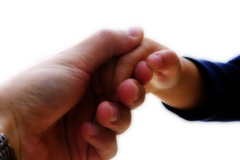
Trauma will affect everyone differently and there are a range of emotional, physical and behavioural responses. There is no ‘right’ way to react to trauma. Some people may react with anger, anxiety, exhaustion or sadness, while others might throw themselves into work or practical tasks. Teenagers especially may withdraw and seem not to react. People’s reactions may vary because of past experiences, available support networks, coping strategies, life skills, and in response to the reaction of others around them. While most people will recover with the support of friends and family, some people will need professional support.
Some people who have been through a life-threatening situation may be affected by post-traumatic stress disorder. This could be a natural disaster such as a flood or bushfire, a serious accident, or an assault. Post-traumatic stress disorder can be recognised by a range of signs and symptoms experienced over an extended time period, and may need professional support.
Providing support and comfort is important to help someone who has experienced a traumatic event recover, but don’t assume you know what they need. Ask them how you can help. Offer practical support like taking care of some of the farm chores, looking after the children, or bring some ready-made meals for the family.
Even if you don’t feel like you are doing ‘enough’ be assured that your support is helping them recover, even if you cannot see any immediate effects. Often just sitting with a person over a cuppa, letting them know you are thinking of them, or inviting them to go for a walk with you can be of great benefit. Encourage them to look after themselves by getting plenty of sleep, eating well, keeping physically active and finding ways to relax.
Helping friends and family after a traumatic or distressing event can be difficult, but you can help. It’s always a good idea to ask the person how you can best support them through the trauma. Listening, talking and practical assistance are all important ways to help. It may take some time before people feel ready to talk about the event. Maintain contact over the long term, when the first rush of community support may have passed. Make sure you follow through on any support you promise.
Find out more about this topic on Better Health Channel
Fast facts:
- People’s reactions to trauma vary a great deal. Research shows that support from family and friends do help people recover.
- Children and teenagers may need extra attention if they’ve experienced a traumatic event.
- Don’t leap in and take over in your eagerness to help. Ask what you can do to help. Offer practical support, but don’t push it.
- Give the person the opportunity to talk about what happened, provide comfort if they become upset.
References used for this topic
More information:
Phoenix Australia: Centre for Posttraumatic Mental Health
Recovery: Helping Others
Australian Psychological Society
Trauma
Better Health Channel
Trauma and primary school age children
Better Health Channel
Trauma and children – tips for parents
Mental Health First Aid
Traumatic events, First aid guidelines for assisting adults
Support After Suicide
Support after suicide
Clinical care:
Phoenix Australia – Centre for Posttraumatic Mental Health
Australian Guidelines for the treatment of adults with Acute Stress Disorder and Posttraumatic Stress Disorder
Research & reviews:
Substance Abuse and Mental Health Services Administration (US)
Understanding the Impact of Trauma
Experimental Neurology
Understanding resilience: New approaches for preventing and treating PTSD
12th National Rural Health Conference Presentation
Complex post-traumatic stress disorder—breaking the silence of the fringe dweller
|
|